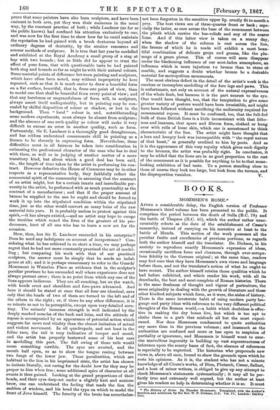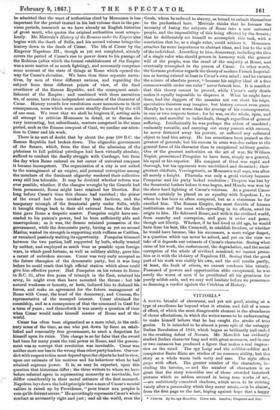BOOKS.
MOMMSEN'S ROME.*
ArrEn. a considerable delay, the English version of Professor Mommsen's third volume has been presented to the public. It comprises the period between the death of Suits (B.C. 78) and the battle of Thapsus (B.C. 46), which the author rather unac- countably selects as the date of the establishment of Caesar's monarchy, instead of carrying on his narrative at least to the battle of Munda. This section of the work possesses all the peculiar faults and excellencies of previous portions, as regards both the author himself and the translator. Dr. Dickson, in his anxiety to reproduce exactly Mommsen's expression of ideas, occasionally sacrifices force and clearness, through over-scrupu- lous fidelity to the German original ; at the same time, readers may feel sure that they have Mommsen's own views and language before them, and not the translator's notion of what be ought to have meant. The author himself retains those qualities which he had before exhibited, and which render his work, with all its drawbacks, the best and most complete of Roman histories. There is the same freshness of thought and vigour of portraiture, the same originality in dealing with the growth of literature and those other kindred subjects which form, as it were, the aisles of history. There is the same inveterate habit of using modern party lan- guage and party ideas with reference to the very different political thoughts of the Roman world,—a habit which doubtless is effec- tive in making the dry bones live, but which is too apt to clothe them in a garb that misleads all but the most experi- enced. Nor does Mommsen condescend to quote authorities any more than in the previous volumes ; and inasmuch as the authorities are confused and more or leas open to suspicion of partiality or ignorance, and Mommsen is himself wont to exer- cise marvellous ingenuity in building up vast superstructures of inference upon the scanty bases of fact, the absence of references is especially to be regretted. The historian who propounds new views is, above all men, bound to show the grounds upon which he rests his opinions. As it is, the student who has not a minute knowledge of all Cicero's works, of Dion, Plutarch, Caesar, Sallust, and a host of minor writers, is obliged to give up any attempt to check Mommsen's statements systematically ; it may all be per- fectly true and extremely well argued, but the author at least gives his readers no help in determining whether it is so. It must • The History of Rome. By Theodor Mommsen. Translated, with the Author's sanction and additions, by the Rev. W. P. Dickson, D.D. VOL IV. London: Bentley 1806. be admitted that the want of authorities cited by Mommsen is less important for the period treated in his last volume than in the pre- vious periods, inasmuch as we have already an English historian of great merit, who quotes the original authorities most scrupu- lously. Mr. Merivale's History of the Romans under the Empire also begins with the death of Sults, and his second volume brings the history down to the death of Caesar. The life of Caesar by the Emperor Napoleon HI., though as yet not completed, already covers the period of Caesar's rise to power down to his passage of the Rubicon (after which the formal establishment of the Empire was a mere matter of so much fighting), and necessarily comprises some account of the state of things at Rome which opened the way for Caesar's elevation. We have thus three separate narra- tives, by men of three different nations, and regarding the subject from three different points of view, of the final overthrow of the Roman Republic, and the consequent estab- lishment of the Empire ; and combined with these narratives we, of course, have three independent estimates of the character of Caesar. History records few revolutions more momentous in their consequences, none which were more steadily directed by the will of one man. We trust that we shall be forgiven if, setting aside all attempt to criticize Mommsen in detail, or to discuss the very interesting, but subordinate, matters comprised in the same period, such as the Roman conquest of Gaul, we confine our atten- tion to Caesar and his work.
There is no sort of doubt that by about the year 100 B.C. the Roman Republic had broken down. The oligarchic government of the Senate, which, from the time of the admission of the plebeians to full political privileges had been virtually absolute, sufficed to conduct the deadly struggle with Carthage, but from the day when Rome entered on her career of universal conquest it became incompetent. The organization of a city is not suited to the management of an empire, and personal corruption among the members of the dominant oligarchy rendered their collective sway still less tolerable. It may be doubted whether reform was ever possible, whether, if the changes 'wrought by the Gra.cchi had been permanent, Rome might have retained her liberties. But long before Caesar's time this chance had vanished ; the power of the sword had been invoked by both factions, and the temporary triumph of the Senatorial party under Sulla, while it brought things back to their old external form, for the first time gave Rome a despotic master. Pompeius might have suc- ceeded to his patron's power, had he been sufficiently able and unscrupulous ; as it was, the Senate retained possession of the government, while the democratic party, having as yet no second Marius, wasted its strength in supporting such ruffians as Catilina, or remained passively waiting its opportunity. Pompeii's trimmed between the two parties, half supported by both, wholly trusted by neither, and employed as much time as possible upon foreign wars, in which good fortune, as well as military ability, gave him a career of unbroken success. Caesar was very early accepted as the future champion of the democratic party, but it was long before he could reach that high official station which alone could give him effective power. Had Pompeius on his return to Rome in B.C. 61, after five years of triumph in the East, retained his army, he might even then have mounted the throne ; but his natural weakness or honesty, or both, induced him to disband his forces, and make an agreement for the future management of Rome with Cmsar, the head of the democracy, and Crassus, the representative of the moneyed interest. Caesar obtained the consulship, and as a consequence of that the command in Gaul for a term of years ; and thenceforth it was merely a question of time when Caesar would make himself master of Rome and of the world.
Caesar has often been stigmatized as a mere 'rebel, in the ordi- nary sense of the time, as one who put down by force an estab- lished and reasonably free government, to erect a despotism for himself upon its ruins. This charge is so far false that the sword had been for many years the real power at Rome, and the govern- ment was so corrupt that revolution was inevitable. Caner was neither more nor less in the wrong than otherparty leaders. Ourver- diet with respect to him must depend upon the objects he had in view, upon our estimate of his motives and his behaviour when he had attained supreme power. It is, as may be expected, upon this question that historians differ ; the three writers to whom we have before referred agree in representing monarchy as inevitable, but difffer considerably in their moral estimate of the first monarch. Napoleon lays down the bold principle that a man of Caesar's mental calibre is raised up by Providence, "pour tracer aux peuples la voie gulls doivent snivre." He accordingly represents Cm.3ar's whole conduct as necessarily right and just ; and all the world, even the
Gauls, whom he reduced to slavery, as bound to submit themselves to the predestined hero. Merivale thinks that he foresaw the necessity of fusing the subjects of Rome into a new universal people, and the impossibility of this being effected by the Senate ; that be deliberately set himself to accomplish this task, with a conviction that he, as a single ruler, could achieve it. Mominsen attaches far more importance to abstract ideas, and less to the will of the individual. According to him, democracy, including the idea of a single ruler who should govern in harmony with the general will of the people, was the creed of the majority at Rome, and eventually triumphed in the person of Caesar. In other words,. the German professor regards the theoryof modern French Imperial- ism as having existed at least in Cm3ar's own mind ; and he excuses the seizure of absolute power, "because his mighty ideal of a free- commonwealth under one ruler" never forsook him. It is manifest that this theory cannot be proved, while Caeaar's early deaths makes it equally impossible to disprove it What he might have done, had the daggers of the assassins not cut short his reign, speculative theorists may imagine, but history cannot even guess. Morally he was not worse than the average of his contemporaries, in one or two respects better ; for he was, on the whole, open, and sincere, and merciful to individuals, though regardless of general suffering. Intellectually he was perhaps the ablest of mankind ; eminently versatile, and carrying out every pursuit with success, he never frittered away his powers, or suffered any collateral object to lead him astray. He has sometimes been praised as the- greatest of generals, but his success in arms was due rather to tile general force of his character than to exceptional military genius.. One of the greatest authorities on the art of war, Sir William, Napier, pronounced Pompeius to have been, simply as a genera,. his equal or his superior. His conquest of Gaul was rapid and thorough, but his opponents were uncivilized and disunited ; their greatest chieftain, Vercingetorix, as Mommsen well says, was after. all merely a knight. Pharsalia was only a great victory because Pompeius and his party lacked resolution ; Thapsus was lost by the Senatorial leaders before it was begun, and Munda was won by the sheer hard fighting of Caesar's veterans. As a general Caesar cannot certainly be placed on an equality with Napoleon I., to. whom he has been so often compared, but as a statesman he far excelled him. The Roman Empire, the most durable of human. institutions and the most wide-spreading in its effects, owed its. origin to him. He delivered Rome, and with it the civilized world, from anarchy and corruption, and gave it order and peace,. though not liberty. Whether, if he had lived to old age, he woukt have done his best, like Cromwell, to establish freedom, or whether- he would have become, like his successors, a mere vulgar despot, is a question which can never be solved, and yet on the view we take of it depends our estimate of Caesar's character. Seeing what. came of his work, the enslavement, the degradation, and the social corruption of the whole of civilized mankind, we cannot praise- him or it with the idolatry of Napoleon III. Seeing that the good part of his work was visibly his own, and the evil results partly, at least, the fault of others, we cannot condemn him utterly_ Possessed of powers and opportunities alike exceptional, he was. surely the worst of men if he prostituted all his greatness for- purely selfish ends, and we may well hesitate before we pronounce so damning a verdict against the Crichton of History.































 Previous page
Previous page